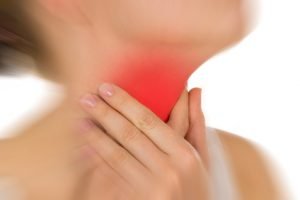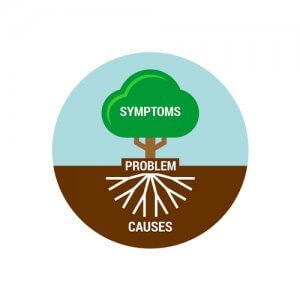What is LPR (Laryngopharyngeal Reflux)
LPR stands for laryngopharyngeal reflux. It is a condition in which acid and other stomach/intestinal contents (pepsin, bile salts, bacteria, and pancreatic enzyme) in the form of liquid or aerosol escape the stomach (reflux) and travel up the esophagus, reaching the throat, sinuses, eustachian tubes and even the lungs resulting in “extraesophageal” symptoms and conditions.
LPR, also referred to as “silent reflux,” reportedly affects approximately 10% of the U.S. population. It occurs in as many as 50% of individuals with voice disorders and 50% of all GERD patients. Typical extraesophageal symptoms of LPR include:
- Hoarseness
- Sore throat
- Wheezing, breathing difficulty
- Throat-clearing and coughing
- Difficulty swallowing
- Globus – a feeling of a lump or something stuck in the throat
- Postnasal drip
- Belching
What Causes LPR?
For LPR to occur:
- Gastric contents must bypass two different groups of sphincter muscles, including LES (Lower Esophageal Sphincter) and UES (Upper Esophageal Sphincter)
- Overcome natural esophageal peristalsis aided by saliva and esophageal gland secretions
Belching is reported to trigger LPR by relaxing both the LES and UES, though this idea was conceived when belching was believed to result from “swallowed air, and not everyone with LPR reports excessive belching.
My more recent theory of the underlying cause of reflux is based on the idea that carbohydrate malabsorption leads to excessive intestinal bacterial overgrowth and gas production. The voluminous amount of microbial gases, including hydrogen, methane, and possibly hydrogen sulfide, produced by overgrowing bacteria (and archaea in some cases) creates enough pressure to overcome sphincter tension. In other words, “relaxation” may not be occurring at all.
One thing is clear. Belching, if present, is a good target and surrogate marker for treatment monitoring.
Standard Treatments for LPR
 Proton Pump Inhibitors (PPIs) for LPR
Proton Pump Inhibitors (PPIs) for LPR
PPIs are often prescribed for LPR. As applied for acid reflux and GERD, this pharmaceutical solution is based on the idea that most symptoms and tissue damage are caused solely by stomach acid. However, this is not correct based on the simple fact that PPIs are no more effective for LPR than placebo.
For more information about PPIs’ (in)effectiveness, please read: LPR Diet – Why PPIs Do Not Work for LPR (Laryngopharyngeal Reflux)?
Surgery for LPR
Most commonly known as Nissen Fundoplication and related surgical procedures (Linx, etc.) seek to improve the esophagus and stomach barrier by strengthening the LES (Lower Esophageal Sphincter) to prevent reflux. By pulling up the very top part of the stomach and tightly securing around the esophagus with sutures or by using other procedures and devices (for example, the LINX Reflux Management System, which employs a band of magnetic titanium beads), the LES is tightened to prevent reflux.
Unlike PPI treatment, anti-reflux surgery can improve LPR symptoms representing a proof of principle that “stopping reflux” is the key to controlling LPR. However, anti-reflux surgery is invasive and linked to post-op complications and side effects.
Dietary Intervention for LPR
Mainstream dietary advice for LPR is to avoid fatty or fried foods, coffee, tea, alcohol, spicy foods, oranges, other citrus fruits, tomatoes, onions, carbonated beverages, chocolate, mint, etc. This anecdotal advice is based on the idea that there is a link between specific “trigger foods” and reflux. Yet, a common thread that explains how and why trigger foods cause symptoms has proved elusive. For more information on this topic, please read GERD diet that works without drugs.
Low acid diets are also recommended based on the idea that reflux deposits pepsin enzyme on the upper esophageal, throat, and vocal cord tissue, which can be activated by acidic foods and drink. Therefore, the approach focuses on actions (avoid acidic foods and drink) to take after reflux has occurred.
Our Integrative and Natural Approach to LPR
Dr. Norm’s Focus for LPR
His focus is on stopping reflux naturally in the first place. This approach will differ from client to client because there are many potential underlying or contributing causes of reflux.
Regardless of which component of reflux (acid, bile, pepsin, bacteria, or pancreatic enzymes), his goal is to help you stop refluxing instead of masking the symptoms or addressing the damage after reflux has already occurred.
As more control over reflux is established, weaning off H2 blockers and/or PPIs (with your doctor’s consent if prescribed) is part of the process as stomach acid is critical for digestion and absorption of key nutrients, vitamins, and minerals, maintaining the health of your microbiome as well as protecting your intestines from incoming pathogens and your lungs from the reflux of intestinal bacteria.
3 Pillar Approach
Dr. Norm uses the following 3 pillar approach in his consultation process:
- Identifying and addressing underlying or contributing causes that are specific to your case
- Science-based dietary intervention aimed at understanding your digestive capabilities and optimizing carbohydrate, protein, and fat digestion and absorption
- Science-based gut-friendly behaviors and practices as well as supplements to optimize digestion and minimize malabsorption
 Identifying and Addressing Underlying Causes
Identifying and Addressing Underlying Causes
Dr. Norm uses science-based risk factor questions to either rule in or out many possible underlying causes. He reviews and analyzes a variety of test results, including but not limited to endoscopy, colonoscopy, blood tests, SIBO tests, comprehensive stool tests, etc.
He may also recommend additional testing to derive meaningful interventions if necessary. Depending upon your specific underlying cause(s), some interventions may involve pharmaceutical or other medical procedures that require you to speak with your primary care doctor or gastroenterologist.
Dietary Intervention
Dr. Norm uses the Fast Tract Diet principles and various other dietary approaches and techniques while accommodating your dietary preferences and practices. He focuses on all 3 food groups, including carbohydrates, proteins, and fats, to aid better digestion and minimize malabsorption.
As part of the dietary intervention, Dr. Norm audits a list of your dietary supplements to ensure that they are helping you, not harming you. He may also recommend a few new dietary supplements based on your specific deficiencies or restorative support. You may also be advised to keep a diet/symptom log for several weeks in some cases for analysis prior to a subsequent session.
Aside from addressing LPR, other digestive and general health issues, including weight loss or weight gain, are part of the process.
Gut-Friendly Behaviors and Practices
Although certain behaviors and practices are critical for better digestion and minimize malabsorption, these do not get much attention. But, this is a critical missing piece. Diligently incorporating the science-based “gut-friendly behaviors and practices” Dr. Norm outlines, you could expand your food faster and easier.
How to make an appointment
Phone
+1 (844) 495-1151 US. Our office hours are from Monday to Friday from 8:30 am to 5 pm Eastern Time.
Online Form
Disclaimer: Dr. Norm is a consulting microbiologist and not a licensed medical practitioner. He will provide you with detailed reports, notes, links for peer-reviewed journals, and additional information and resources after each appointment which you can share with your own doctor(s).
 Proton Pump Inhibitors (PPIs) for LPR
Proton Pump Inhibitors (PPIs) for LPR Identifying and Addressing Underlying Causes
Identifying and Addressing Underlying Causes